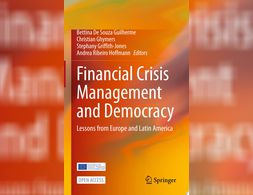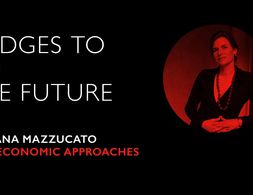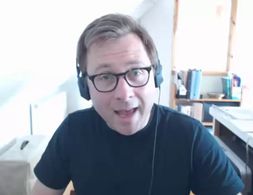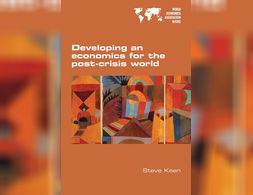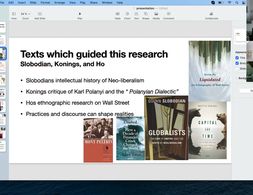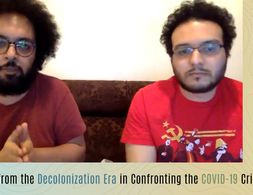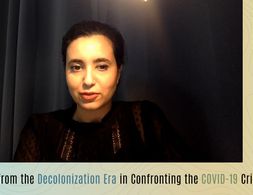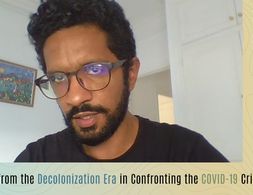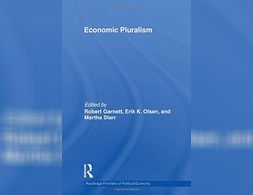✕
986 results
Anwar Shaikh seeks in his lectures for alternative explanations for empirically observed macro and microeconomic patterns of economic fluctuations, price volatility, and economic development.
The 2007-2008 financial crisis exposed the shortcomings of mainstream economic theory with economists unprepared to deal with it. In the face of this, a major rethinking of economics seems necessary and in presenting alternative approaches to economic theory, this book contributes to the rebuilding of the discipline.
This course introduces students to political economy and the history of economic thought. We will cover the core ideas in various schools of economic thought, positioning them in the historical and institutional context in which they were developed. In particular, we will cover some economic ideas from the ancient world and the middle ages; the enlightenment; the emergence of and main ideas in classical political economy (Adam Smith, David Ricardo, Thomas Malthus, and others); Marx, Mill, and Keynes; European versus American economic thought through history; the rise of mathematical economics; economic theories around state-managed economies versus socialism; Austrian economics; behavioral economics; and the future of economics.
Latin America and Europe can both learn from their respective experiences on crisis response and the distributive and democratic implications at national and regional level Democratic and distributive aspects of crisis response monetary financial economic policies and institutional reforms are key but have not been adequately addressed in the literature …
Exploring Economics Dossier on the economic fallout of the COVID-19 pandemic and the structural crisis of globalization. COVID-19 encounters a structural crisis of globalization and the economic system that drives it, with an uncertain outcome. We asked economists worldwide to share with us their analysis of current events, long-term perspectives and political responses. The dossier will be continuously expanded.
An analysis of the modern neoliberal world, its characteristics, flaws and planetary boundaries aiming to end new economic politics and support a global redistribution of power, wealth and roles.
In this online lecture, economist and Professor at the School of Oriental and African Studies (SOAS), London, UK. Costas Lapavitsas, explains the limitations of the neoliberal market in creating financial stability and growth in both, developing and developed countries.
By conducting a discourse analysis (SKAD) in the field of academic economics textbooks, this paper aims at reconstructing frames and identity options offered to undergraduate students relating to the questions ‘Why study economics?’ and ‘Who do I become by studying economics?’. The analysis showed three major frames and respective identity offerings, all of which are contextualized theoretically, with prominent reference to the Foucauldian reflection of the science of Political Economy. Surprisingly, none of them encourages the student to think critically, as could have been expected in a pedagogical context. Taken together, economics textbooks appear as a “total structure of actions brought to bear upon possible action” (Foucault), therefore, as a genuine example of Foucauldian power structures.
The U.S. economy today is confronted with the prospect of extended stagnation. This book explores why. Thomas I. Palley argues that the Great Recession and destruction of shared prosperity is due to flawed economic policy over the past thirty years.
The world is still feeling reverberations from the financial crisis of 2008 foreseen by neither politicians nor economists The history of capitalism has been punctuated by major crises exposing the fragility of our entire economic system How has capitalism despite these ruptures managed to each time resurface more resilient and …
The COVID-19 pandemic has had far-reaching implications across the African continent. This discussion brings to light the role of African think tanks, such as the African Center for Economic Transformation (ACET) in rethinking the continent’s development models, especially, in light of the unprecedented crisis.
In this interview Mariana Mazzucato talks about economic actions governments need to take facing the Corona-crisis. Using the example of Britain, she argues that governmental bailouts need to be bound to commitment to sustainability.
This article provides a contextual framework for understanding the gendered dimensions of the COVID-19 pandemic and its health, social, and economic outcomes. The pandemic has generated massive losses in lives, impacted people’s health, disrupted markets and livelihoods, and created profound reverberations in the home. In 112 countries that reported sex-disaggregated data on COVID-19 cases, men showed an overall higher infection rate than women, and an even higher mortality rate. However, women’s relatively high representation in sectors hardest hit by lockdown orders has translated into larger declines in employment for women than men in numerous countries. Evidence also indicates that stay-at-home orders have increased unpaid care workloads, which have fallen disproportionately to women. Further, domestic violence has increased in frequency and severity across countries. The article concludes that policy response strategies to the crisis by women leaders have contributed to more favorable outcomes compared to outcomes in countries led by men.
The recent financial meltdown and the resulting global recession have rekindled debates regarding the nature of contemporary capitalism.
In the fifth part of the Economics of COVID-19 Webinar by SOAS, Jo Michell sketches out the effects of the COVID-19 pandemic on the wider macroeconomy and warns against a resurgence of austerity politics.
This book is a collection of Steve Keen's influential papers published over the last fifteen years. The topics covered include methodology, microeconomics, and the monetary approach to macroeconomics that Keen - along with many other non-mainstream economists - has been developing.
The economic crisis is also a crisis for economic theory. Most analyses of the evolution of the crisis invoke three themes, contagion, networks and trust, yet none of these play a major role in standard macroeconomic models. What is needed is a theory in which these aspects are central.
The Great Recession 2.0 is unfolding before our very eyes. It is still in its early phase. But dynamics have been set in motion that are not easily stopped, or even slowed. If the virus effect were resolved by early summer—as some politicians wishfully believe—the economic dynamics set in motion would still continue. The US and global economies have been seriously ‘wounded’ and will not recover easily or soon. Those who believe it will be a ‘V-shape’ recovery are deluding themselves. Economists among them should know better but are among the most confused. They only need to look at historical parallels to convince themselves otherwise.
Banner and Pastor debunk granted assumptions of the neoclassical theory, such as self-interested human behavior, the necessity of inequality and growth, to pull the threads between the new possible foundations of our society, "prosperity, security and community".
This lecture was held in the context of the a two day conference called Which pluralism for thinking about how to achieve a more sustainable and resilient economy The practices institutions and system logics of today s economy are not suitable for appropriately addressing fundamental human needs The climate crisis …
In this podcast 'How Economic Theory and Policy Reinforce Racism' William Spriggs, the AFL-CIO’s chief economist, discusses the inadequacies of the pandemic economic rescue package and the influence of mainstream economic theory. He further explores how mainstream economic theory continues to fail everyone, especially Black communities, by disregarding history.
Post-Colonialisms Today researchers Kareem Megahed and Omar Ghannam discuss the importance of industrial policy during the pandemic to improve domestic capacity for manufacturing essential goods.
Approaching the law of nature that determines all forms of economy. The bulk of economic theory addresses the economic process by setting out on a catalogue of aspects, seeking the laws in the aspects and hoping to get together a reliable view of the whole.
This video explains what the term 'Feminist Economics' describes and goes into detail on how feminist economists use methodology differently, why they advocate for diversity in research and how to look into preconditions for the functioning of our economies. It, additionally, highlights the link between feminist economics and the study of climate change.
This course seeks to interpret capitalism using ideas from biological evolution. The lectures are foundational on neoclassical economics and economist, as well as their roles in the proliferation of capitalist ideology. However, it is less concerned with the ultimate judgment of capitalism than with the ways it can be shaped to fit more specific objectives.
Jihen Chandoul, a member of the Post-Colonialisms Today Working Group, discusses the impact of import-dependency on African food supply chains since the onset of the COVID-19 pandemic.
Post-Colonialisms Today researcher Chafik Ben Rouine looks to Tunisia’s post-independence central banking method to provide insight on what progressive monetary policy can look like.
What’s inflation? Why is it relevant? And is there an agreed theory about its roots and causes, or is it a contentious concept? That’s what this text is all about: We define what inflation actually means before we delve into the theoretical debate with an interdisciplinary and pluralist approach: What gives rise to it, what factors might influence it, and, consequently, what might be done about it?
The workshop deals with the contribution of Plural Economics to the urgently needed change of the economic system towards sustainability and global responsibility.
After completing the module, participants should be able to demarcate and explain different economic approaches to sustainability. They should be able to evaluate the respective concepts based on their contribution to the ecological transformation of the economic system.
This article outlines the fundamental challenges of democratically planned economies and categorises proposed models into six groups, each of which approaches planning and coordination at different levels of authority and between myriad economic units in a particular way, taking into account efficiency as well as democratic principles and environmental and social sustainability. Through a classification system based on decision-making authority and mediation mechanisms, the article provides a framework for understanding and comparing these models. By examining their different approaches, it offers insights into the complexities and potential paths of democratically planned economies in the 21st century.
The leading edges of economic thinking in the early 21st century are marked by a nascent pluralism - a positive valuing of difference and complexity - regarding the nature and evolution of human behaviour and economic organization. Economic Pluralism brings these pluralist sensibilities to the fore.
Dependency in Central and Eastern Europe - Self-reliance and the need to move beyond economic growth
In this essay, the author takes a critical perspective on the pursuit of growth as the solution for providing for environmental sustainability and economic stability in the countries of Central and Eastern Europe.
Drawing from the framework of dependency theory and presenting brief insights into European core-periphery relations the author then argues for the implementation of an alternative strategy to development that is built around the concept of self-reliance.
Economic sociology is an entire subfield and one could write an series on it, so I’m going to stick to probably the most prominent economic sociologist and the founder of ‘new economic sociology’, Mark Granovetter.
Necesitamos cookies. Pincha en “Aceptar” para ayudarnos a hacer de Exploring Economics una mejor plataforma.




